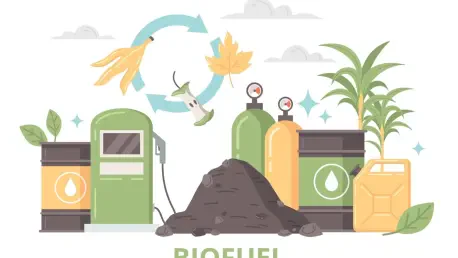Navigating the Intersection of Biofuel and Agriculture
The global biofuel and agricultural sectors are experiencing a transformative period as companies like Eni shift their strategies toward more sustainable and environmentally friendly practices. Eni’s move from palm oil to alternative vegetable oils signifies a shift that highlights the company’s attempts to mitigate environmental concerns associated with palm oil production. This transition is not only a strategic move in the sustainability arena but also a response to the emerging technological influences and regulatory pressures within these industries. Notably, Eni and other market players pursue innovations while adhering to frameworks such as the EU’s Renewable Energy Directive, which shapes the dynamics of biofuel production and usage.
Unpacking Trends in Eni’s Agricultural Ventures
Strategic Changes in Biofuel Feedstock
Eni’s decision to transition from non-food to edible crops for biofuel feedstock marks a substantial strategic shift influenced by market drivers and technological advances. The push toward edible crops underscores a response to consumer behaviors favoring sustainable options. As emerging technologies streamline biofuel production from vegetable oils like soy and sunflower, Eni is betting on enhanced efficiency and sustainability. This movement reflects broader industry trends as companies seek eco-friendly alternatives that synergize with evolving consumer expectations.
Market Dynamics and Growth Insights
A detailed analysis of vegetable oil and biofuel markets demonstrates compelling growth trajectories, with projections indicating significant expansion opportunities. Eni’s strategy aligns with these trends, leveraging data-driven insights to enhance its biofuel operations. As the demand for sustainable energy resources increases, performance indicators suggest robust growth potential, crucial for Eni’s ambitious targets for vegetable oil production by 2028. These projections reveal promising avenues that align with Eni’s focus, supported by current technological advancements and regulatory shifts.
Addressing Challenges and Intricacies in Eni’s Strategy
Challenges in Eni’s agricultural projects are multifaceted, involving sustainability and efficiency constraints. In particular, its strategy faces hurdles such as land usage and production complexities. Sustainable solutions must include innovative practices to enhance productivity while preserving environmental integrity and addressing socio-economic impacts. Eni’s commitment to mitigating challenges is essential to ensure that agricultural initiatives effectively contribute to biofuel production while supporting local ecosystems and food security.
Implications of Regulatory Frameworks
Significant regulatory developments present both challenges and opportunities for Eni’s operations in Congo. Specifically, the EU’s Renewable Energy Directive (RED II) influences the biofuel sector by imposing stricter guidelines on vegetable oil usage. Compliance with such regulations is crucial for Eni as it maneuvers within this complex landscape. The company must align its Congo projects with these directives to ensure both sustainability and regulatory accountability, balancing its operations with European policy changes.
Industry Outlook and Strategic Pathways
Examining future industry directions showcases promising prospects for Eni amid evolving technological advancements and market trends. Potential disruptors, such as new technologies and changing consumer preferences, may reshape the biofuel and agricultural sectors. Innovation remains key, offering pathways to sustainable growth in the global economic climate. Additionally, Eni’s initiatives continue to emphasize energy security and agricultural development, reinforcing its strategic position within the broader industry framework.
Reflecting on Eni’s Journey and Strategic Recommendations
The report illuminates Eni’s comprehensive strategy as it navigates the intricacies of expanding agricultural ventures in Congo. Despite inherent challenges, Eni’s pursuit contributes to biofuel production while attempting to balance socio-economic considerations. Recommendations focus on fostering growth through sustainable investment and adaptive strategies, ensuring alignment with industry progression. Eni’s efforts across Africa exemplify its resolve, presenting opportunities for strategic enhancement while responding to global energy and economic transitions.









